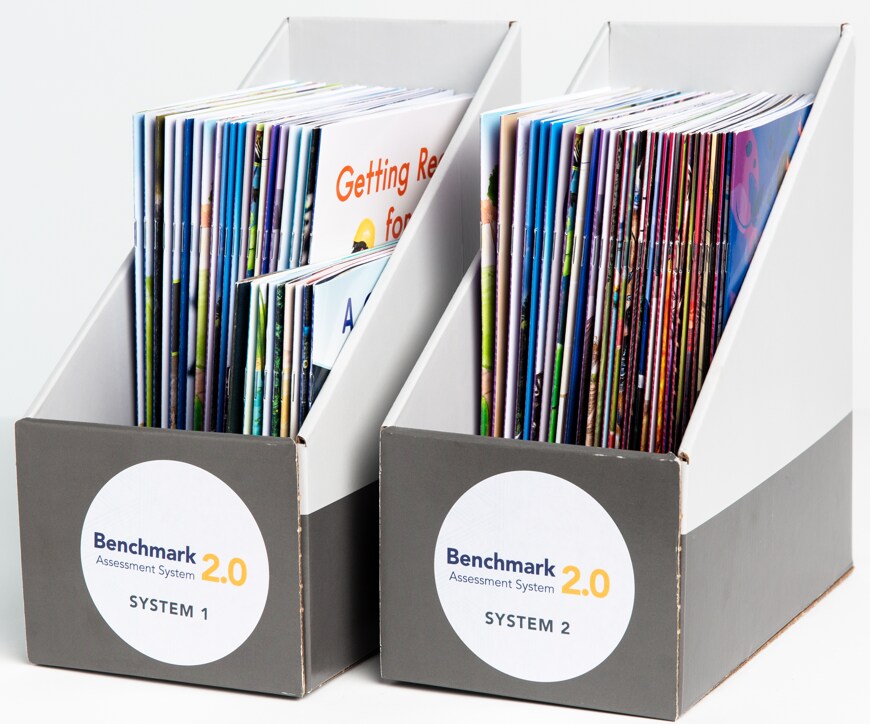
Availability in Canada
BAS 2.0 is currently unavailable in Canada due to international access limitations with its digital components. We are working on a solution and hope to have it available for Canadian schools in late Spring 2026. Stay tuned for updates!

Benchmark Assessment System (BAS) 2.0 provides a comprehensive view of each student's reading abilities, assessing critical aspects of their literacy development. One-on-one assessment conferences uncover student reading behaviors in a way other assessments can't, offering educators a deep understanding of each student's strengths and areas for growth. That's why BAS 2.0 should be part of the assessment strategy for every school and district.
What’s new in BAS 2.0?
Early Literacy
Understanding Early Literacy Development: Levels A-D
Assessing students at levels A-D is crucial for understanding and supporting the foundational stages of their literacy journey. These early text levels, and the corresponding assessment protocols, are designed to capture a comprehensive picture of emergent readers' abilities-focusing on key aspects such as concepts about print, phonological awareness, and early phonics skills.
Concepts About Print: Levels A and B
Level A and B texts are foundational tools specifically created to assess emergent readers' knowledge of print conventions, phonological awareness, and early phonics skills. At these levels, the focus is on ensuring that students can navigate books, recognize the direction of print, and understand basic letter-sound relationships.
Expanding Reading Skills: Levels C and D
Levels C and D are designed to build upon the foundational skills assessed in levels A and B, expanding students' early phonics abilities and comprehension. These texts provide a more structured approach to phonemic awareness and early reading skills, helping teachers to understand how students are transitioning from emergent to early readers.
Assessment
Assessment that Informs Instruction
BAS 2.0 makes it easier than ever for teachers to go from assessment to instruction. High-impact tools and content empower educators to pinpoint students' literacy proficiencies and needs during one-on-one assessments. It's data that truly makes a difference in the classroom.
The data from a one-on-one assessment conference will help:
- Determine Reading Levels: Find a starting text level for each student for small-group instruction.
- Target Intervention Needs: Identify students who require additional support, and the specific skills or competencies that require intervention.
- Form Small Groups: Organize flexible small groups for more personalized reading instruction based on assessment data.
- Select Appropriate Texts: Choose texts that will be most productive and appropriate for each student's instructional needs.
- Plan Instruction: Develop efficient and effective whole-group and small-group lesson plans tailored to the students in your classroom.
Digital Access
Experience the Convenience of Digital Access
With Fountas & Pinnell Literacy™ Digital (FPL Digital) subscriptions, BAS 2.0 is enhanced through convenient digital access to your most important assessment tools. Getting started has never been easier!
- Your Expansive Assessment Library: Planning and prep are simpler with total access to your library of BAS 2.0 books and other assessment tools. Quickly view, download, and print rubrics, recording forms, and access The Fountas & Pinnell Literacy Continuum eBook for instructional insights.
- Intuitive Online Navigation: A thoughtfully designed online experience tailored for educators makes finding your essential BAS 2.0 assessment tools straightforward and efficient.
- Easier One-Click Access: Streamline your planning by logging in to your account once for full access to your entire suite of FPL Digital subscriptions and FPL online resources. One click puts all your tools, resources, and content at your fingertips.


